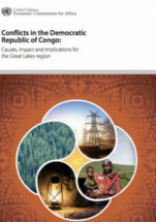Conflicts in the Democratic Republic of Congo: Causes, impact and implications for the Great Lakes region

The Democratic Republic of Congo is recovering from conflicts, posting substantial improvement in overall macroeconomic performance since the cessation of the war, on the back of robust copper and cobalt exports. Inflation has also declined remarkably and it has stabilized at single-digit levels thanks in major part to restrictive fiscal policy achieved through expenditure compression. These positive developments notwithstanding, the country remains confronted with structural problems at the sectoral level as well as high levels of poverty, high unemployment especially for the youth, and inadequate access to basic social services for the majority of the population especially in the rural areas.
The conflicts in the DRC and their aftermath remain a major cause of concern, as they pose a multi-dimensional challenge to economic and human development in the country and in the region. This calls for high-level attention at regional and global levels to support the DRC government in the search for a solution to conflicts and in its efforts to put the country back on a path of sustainable development. In this context, this report seeks to contribute to deepening knowledge on the root causes and developmental implications of the conflicts in order to formulate informed policy decisions at national, regional, and international levels. The report is organized in four chapters: an introductory chapter, a second chapter analyzing the root causes of the conflict, a third chapter documenting and discussing the development impact of the conflicts on the DRC economy and on the region, and a concluding chapter providing key messages and some policy recommendations.